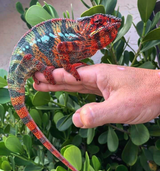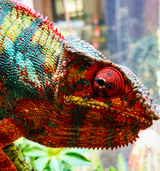



Biggie - Ambilobe Panther Chameleon
Biggie Smalls is a Wild Caught Ambilobe Panther Chameleon we have had in our collection for a year. He has been a great addition to our breeding program and we are very excited to see how his babies develop. His colors are Reds and Blues.
You can find his available babies here.
Panther chameleons are one of the most colorful chameleon species available today. They are native to the island of Madagascar.
Male panther chameleons typically have a body length of 12 to 18 inches while females are slightly smaller at 10 to 14 inches. The average weight of a male panther chameleon is between 140 and 180 grams in weight, and a female panther chameleon will weigh between 60 to 100 grams.
Life Span
The average life span of a panther chameleon is 5 to 7 years.
Caging
Below are the minimum size enclosure we recommend:
- Baby - 16 inches long by 16 inches wide by 20 inches tall will work for the first six months of life.
- Adult - male panther chameleons should be kept in a minimum of 18 inches long by 18 inches wide by 36 inches tall enclosures, whereas female panther chameleons can be kept in 16 inches long by 16 inches wide by 30 inches tall enclosures.
We recommend using live plants in your enclosure. Examples of plants we use are Ficus Benjamina, Schefflera, and Pothos. It is important to incorporate a number of branches and vines for the chameleon to climb on. They should be place at various height through out the enclosure.
Lighting and Temperature
Provide two types of light: one UVB liner bulb and one heat bulb of appropriate wattage. Adult panther chameleons need a basking spot of around 90 degrees Fahrenheit with the ambient temperature between 75 to 85 degrees; younger panther chameleons should have a basking area of 85 degrees with a lower ambient temperature of around 75 degrees.
For our cages we place the heat bulb in one corner and the UVB liner bulb diagonal across the top.
Food
Crickets are typical the main staple food, but superworms, silkworms, hornworms, waxworms, roaches, etc., can all be feed to your panther chameleons. Gut-loading insects is very important to ensure the chameleon receive proper supplements. In addition to gut-loading insects, we recommend dusting your insects with vitamin powders. We recommend using calcium (without D3) and bee pollen three times a week, multivitamin with D3 twice a month.
Water
We recommend misting the chameleon two to three times a day to help keep the humidity in the required 60 to 70 percent range. We provide misting sessions of 2-3 minutes in the morning and afternoon. These long misting session allow all the live plants in the enclosure to get wet allowing the chameleon to drink directly from the leaves.
Supplements
Calcium without vitamin-D3: Lightly dust insects 3 times a week.
Bee Pollen: Lightly dust insects each feeding.
Multi-Vitamin with D3: Lightly dust insects 2 times a month throughout the chameleon’s life.
Here is a link to our suggested Set up for a Panther Chameleon: